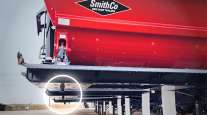July Trailer Orders at 13,200, Down for 4th Month in a Row
This story appears in the Sept. 5 print edition of Transport Topics.
Truck fleets ordered 13,200 new commercial trailers during July, a 20% increase over July 2010, but the fourth straight month of declining figures, ACT Research Co. reported.
Trailer manufacturers attributed the declines to the “typical” summer slowdown, although two officials said they have seen a rebound in preliminary August orders.
“Our orders were off some in July, and in fact we were a mirror image of what ACT was saying,” Glenn Harney, chief sales officer of Hyundai Translead, San Diego, told Transport Topics on Aug. 29. “However, we’ve had an exceptionally strong August. . . . People are still replacing [aging] trailers, and they’re getting their plans together a little earlier for 2012.”
Through July, there have been 132,300 net orders for trailers this year, compared with 82,900 in the first seven months of 2010, ACT said.
Monthly totals had remained above 20,000 through March, when they reached 28,705, the monthly high of the current recovery, ACT said. Since then, they have declined to 19,579 in April, 13,600 in May and 13,428 in June.
“From a net order standpoint, we’re up 60% year-over-year through July,” said Frank Maly, ACT’s director of commercial vehicle transportation and analysis. “The existing backlog is almost double of a year ago.”
The 2011 build backlog stood at 93,600 at the end of July, ACT said, up 97% from the July 2010 backlog of 47,400.
“We saw no drop in activity in July, and we have started accepting orders for the first quarter next year, and we have booked quite a few,” Charles Mudd, president of Vanguard National Trailer Corp., Monon, Ind., told TT.
He said Vanguard’s factory was “maintaining maximum capacity.”
“I think it’s important to note for 2012 that there is still a major list of big fleets out there who have not bought new trailers yet,” Mudd added. “We have talked to some, but they haven’t pulled the trigger yet. I don’t know that I detect stronger growth for 2012 than now, but at least enough to support current manufacturing levels.”
“New orders slowed during July like normal during summer, but not dramatically from the normal high intake during March and April,” said Craig Bennett, senior vice president of sales and marketing for Utility Trailer Manufacturing Co., City of Industry, Calif.
“Our business remains fairly strong, and our backlog is back to 2011 beginning-of-the-year levels, averaging around three-and-a-half months.”
“The total new order number was literally exactly the same as in June,” ACT’s Maly explained. “The difference comes from a 2% cancellation rate, which is still below the normal monthly cancellation rate. Nothing has changed that causes concern right now.”
Chris Hammond, vice president of dealer sales at Great Dane Trailers, Savannah, Ga., agreed, but was unsure of the second half of the year.
“We’re still in July orders, we’re in the summer lull, so that the number doesn’t shock me or create any fear,” Hammond told TT.
“There was such an under-build in the past few years that the trailer fleet averages over eight years old, which is very old by usual standards,” Hammond added. “This is what is going to continue to drive the trailer business, into 2012.”
He explained that dry-van sales led the surge early this year, “but now flatbed and reefer [refrigerated vans] sales are bursting at the seams.”
“Still, its going to be interesting to see what the third and fourth quarters bring, because of the general economic uncertainty,” Hammond said.
David Giesen, vice president of sales and marketing at Stoughton Trailers, Stoughton, Wis., was also cautiously optimistic.
“Customers tell us they’re still buying new trailers to replace their old ones, rather than to expand their fleets,” Giesen told TT. “There is still more replacement that’s needed, so we believe the growth will continue, even if fleets don’t expand.”
Giesen said that the level of orders in June and July were “typical of summer slowdowns” and Stoughton was “busy building new orders” from earlier in the year.
“There were some potential customers who were apprehensive about the slow economy,” Giesen said. “The first part of August was slow, but we saw uptick in the latter part of the month, and hopefully, we’ll be able to sustain that longer.”
Hyundai’s Harney said the company had just started to plan production expansion.
“Yes, we’re sold out for the year, so that we’re trying to decide how to increase capacity,” Harney said.
Hyundai’s plant is located in Tijuana, Mexico.
“The best way to do it may be to add more shifts, but we haven’t decided yet,” he added.
In 2009, new orders came in at 81,300, the lowest total since 1975.
Last year, orders quickened in the second half of the year, going from about 11,000 in July to 21,314 in November.




